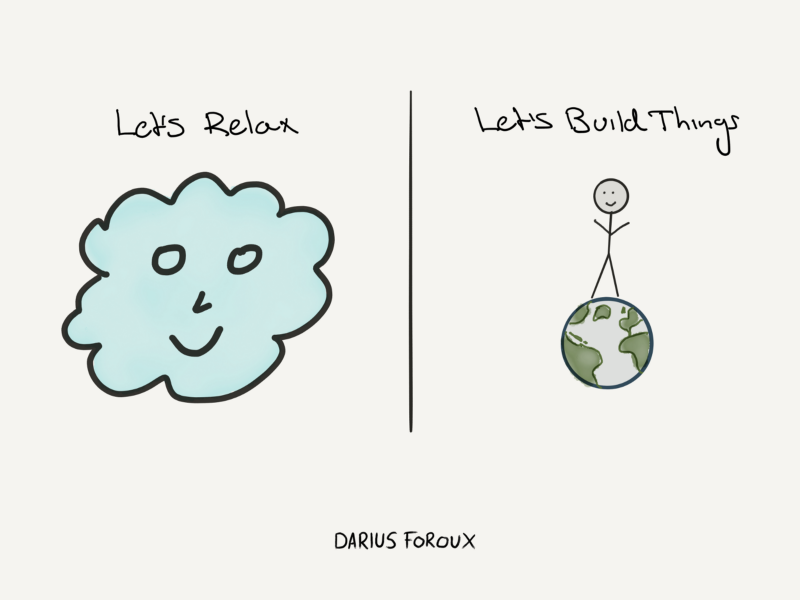EasyBlog
This is some blog description about this site
4 minutes reading time
(856 words)
The Men Who Are Convinced We’re All Living in a Simulation
Dale Baker was introduced to simulation theory five years ago as an 18-year-old freshman at the University of Iowa. The idea that our reality may be nothing more than a computer-generated simulation was first presented to him in his Religion vs. Science class. Later, he discovered the work of Oxford University philosophy professor Nick Bostrom, one the world's leading simulation theorists.
Still, Baker didn't believe in simulation theory outright; he merely considered it plausible. The Earth, as we know it, is 4.5 billion years old, he reasoned. That's enough time for a civilization to evolve to the point where they could create such a simulation.
That all changed last November, though, when the Chicago Cubs, the most historically futile franchise in the history of professional sports, won the World Series, and Donald Trump, the most historically unqualified candidate in the history of the U.S. presidency, won the Electoral College.
I come to the reality that this entire world is fake. We don't really exist. The Cubs and Trump in the same year?? This is a simulation.
— Lawrence (@oceankusher) November 9, 2016
The tweet was part-joke, part-truth. "I was dumbfounded at the events that occurred," Baker says. "If Trump and the Cubs can win, anything is possible."
Few would argue his point that the past year has been strange. Apart from the two examples above, there's been a constant barrage of natural disasters; the New England Patriots' improbable comeback victory in Super Bowl LI; a possible nuclear war with North Korea; the reality-distorting effects of fake news; the sudden deaths of Prince, David Bowie and other legendary pop culture figures; and most recently, the spate of sexual abuse and harassment charges that have upended industry power structures that once seemed indestructible.
Some have welcomed the changes, but for others, they've been so drastic and swift that they defy all logic. Rather, they're proof that the simulation is real — and that whoever is at the helm has started fucking with the levers.
Simulation theory may seem like the kind of thing only a stoned freshman would believe in, but there's some legitimate academic rigor to the idea. It's a popular area of study in both philosophy and theoretical physics (which is like the philosophy of the sciences), and the central idea is that our reality isn't reality at all, but instead, a simulation created by some hyper-intelligent species.
Essentially, we're all characters in a universe-size version of The Sims, or avatars in The Matrix.
For philosophers, entertaining simulation theory is just one part of pondering the nature of our existence. But simulation theory gets really interesting when you enter theoretical physics and view it through the lens of multiverse theory. Multiverse theory posits that ours is but one of an infinite number of realities existing parallel to one another, in alternate dimensions. And if you accept multiverse theory, the idea of the simulation stops being a fun thought experiment and becomes a mathematical certainty.
Under multiverse theory, there are infinite universes inhabited by an infinite number of intelligent civilizations, creating an infinite number of simulations. And an infinite number of those simulations have created their own simulations — simulations within simulations. Inception.
If that's to be believed, the chances we're not living in a simulation become so infinitesimally small as to effectively not even exist.
Billionaire tech entrepreneur Elon Musk claims there's a "one in billions" chance that we're not living in a simulation and that this world is the base reality, but even that figure is a hilarious overstatement, according to its proponents. "It would've been weird to bring up the simulation in conversation a few years ago," says Kurt Friedrich, a 31-year-old web developer in Indianapolis. "Someone would've just laughed nervously and kept going in the conversation. But now you can usually find at least one other person in a group to talk to you about it."
2016
— Kurt Friedrich (@kurrrtle) October 23, 2016
RIP bowie + prince
trump is a presidential candidate
cubs in the world series
still think ur not in a simulation?
wake up sheeple
Much like Baker, Friedrich has had a passing interest in simulation theory since he first discovered it several years ago. He came about the idea in science articles, and by way of popular astrophysicist Neil deGrasse Tyson. (Tyson is apparently a realist; he places the odds of the simulation at 50–50.)
But the mainstreaming of the simulation theory is largely thanks to Musk. To hear a man of his intelligence casually assume that our reality is not, in fact, real piqued people's interest.
Google Trends shows that searches for "simulation theory" exploded right after Musk made his "one in billions" chance comment last June. And they reached a new peak that October, after it was revealed that two unnamed Silicon Valley tycoons were funding an effort to break us free from the simulation. By the time the Cubs won the World Series and Trump won the presidential election a month later, the idea that none of this is real was already in the zeitgeist.
"It was weirdly coincidental," Friedrich says of last fall. "It sparked a lot of conversation [about simulation theory]. I saw more people in my friend group talk about it in everyday conversation."





Comments 2
Choice of Luxury Vehicles for Airport Transfers
Black Car EveryWhere has a new fleet of many vehicles. Providing Airports Transfers Services within the City of Chicago and suburban destinations. You can choose Executive Black Cars, SUVs, Black Sedans, Mercedes, Vans, and Buses. Stretch Limos, Limo Cars. You can also request custom features subject to the nature of your requirements for the trip. Our luxury cars and limos come with professional and expert Chauffeurs.
https://blackcareverywhere.com/airport-transfer-services/
This is truly a great read for me. I have bookmarked it and I am looking forward to reading new articles. Keep up the good work!. 3d product customizer